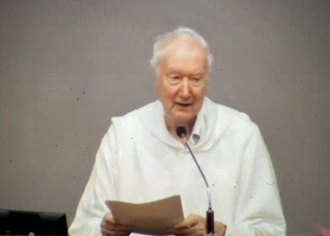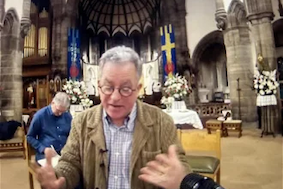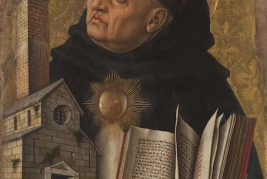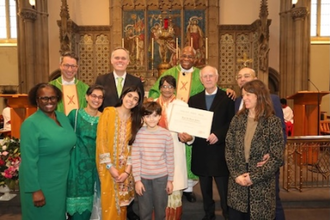First Synod Retreat Meditation with Fr Timothy Radcliffe OP

ICN Screenshot
Source: Vatican News
On Sunday morning, 1 October, Dominican Friar and former Master of the Order of Preachers, Father Timothy Peter Joseph Radcliffe, reflected on the meaning of 'Hoping against hope' with those who will participate in the General Assembly of the Synod of Bishops set to begin on Wednesday, 4 October.
When the Holy Father asked me to give this retreat, I felt enormously honoured but nervous. I am deeply aware of my personal limitations. I am old - white- a Westerner- and a man! I don't know which is worse! All of these aspects of my identity limit my understanding. So I ask for your forgiveness for the inadequacy of my words.
We are all radically incomplete and need each other. Karl Barth, the great Protestant theologian, wrote of the Catholic 'both/ and.' For example, Scripture and tradition, faith and works. He is said to have called it the 'damned Catholic "And"', 'das verdammte katholische "Und"'. So when we listen to each other during the coming weeks and disagree, I pray we shall often say, 'Yes, and…..' Rather than 'No'! That is the Synodal way. Of course, No is also sometimes necessary!
In the second reading at Mass today, St Paul says to the Philippians: 'Complete my joy by being of the same mind, with the same love, united in heart, thinking one thing'. (Philippians 2.2). We are gathered here because we are not united in heart and mind. The vast majority of people who have taken part in the synodal process have been surprised by joy. For many, it is the first time that the Church has invited them to speak of their faith and hope. But some of us are afraid of this journey and of what lies ahead. Some hope that the Church will be dramatically changed, that we shall take radical decisions, for example about the role of women in the Church. Others are afraid of exactly these same changes and fear that they will only lead to division, even schism. Some of you would prefer not to be here at all. A bishop told me that he prayed not to be chosen to come here. His prayer was granted! You may be like the son in today's gospel who at first does not want to go to the vineyard, but he goes!
At crucial moments in the gospels, we always hear these words: 'Do not be afraid.' St John tells us 'Perfect love casts out fear.' So let us begin by praying that the Lord will free our hearts from fear. For some this is the fear of change and for others the fear that nothing will change. But 'the only thing we have to fear is fear itself.[1]'
Of course, we all have fears, but Aquinas taught us that courage is refusing to be enslaved by fear. May we always be sensitive to the fears of others, especially those with whom we disagree. 'Like Abraham, we leave not knowing where we are going (Hebrews 11.8). But if we free our hearts of fear, it will be wonderful beyond our imagination.
To guide us during this retreat, we shall meditate on the Transfiguration. This is the retreat Jesus gives to his closest disciples before they embark on the first synod in the life of the Church, when they walk together (syn-hodos) to Jerusalem. This retreat was needed because they were afraid of this journey they must make together. Until now they have wandered around the north of Israel. But at Caesarea Philippi, Peter confessed that Jesus was the Christ. Then Jesus invites them to go with him to Jerusalem, where he will suffer, die and be raised from the dead. They cannot accept this. Peter tries to prevent him. Jesus calls him 'Satan', 'enemy'. The little community is paralysed. So Jesus takes them up the mountain. Let us listen to St Mark's account of what happened.
'Six days later, Jesus took with him Peter and James and John, and led them up a high mountain apart, by themselves. And he was transfigured before them, and his clothes became dazzling white, such as no one on earth could bleach them. And there appeared to them Elijah with Moses, who were talking with Jesus. Then Peter said to Jesus, "Rabbi, it is good for us to be here; let us make three dwellings, one for you, one for Moses, and one for Elijah." He did not know what to say, for they were terrified. Then a cloud overshadowed them, and from the cloud there came a voice, "This is my Son, the Beloved; listen to him!" Suddenly when they looked around, they saw no one with them anymore, but only Jesus.' (9.2 - 8).
This retreat gives them the courage and hope to set off on their journey. It does not always go well. They immediately fail to free the young lad from the evil spirit. They quarrel about who is the greatest. They misunderstand the Lord. But they are on their way with a fragile hope.
So we too prepare for our synod by going on retreat where, like the disciples, we learn to listen to the Lord. When we set off in three days' time, we shall often be like those disciples, and misunderstand each other and even quarrel. But the Lord will lead us onwards towards the death and resurrection of the Church. Let us ask the Lord to give us hope too: the hope that this synod will lead to a renewal of the Church and not division; the hope that we shall draw closer to each other as brothers and sisters. This is our hope not just for the Catholic Church but for all our baptised brothers and sisters. People talk of an 'ecumenical winter'. We hope for an ecumenical spring.
We also gather in hope for humanity. The future looks grim. Ecological catastrophe threatens the destruction of our home. Wildfires and floods have devoured the world this summer. Small islands begin to disappear under the sea. Millions of people are on the road fleeing from poverty and violence. Hundreds have drowned in the Mediterranean not far from here. Many parents refuse to bring children into a world that appears doomed. In China, young people wear T-shirts saying, 'We are the last generation'. Let us gather in hope for humanity, especially hope for the young.
I don't know how many parents we have at the Synod, but thank you for cherishing our future. After a difficult time in South Sudan, on the frontier with the Congo, I flew back to Britain beside a child who screamed without interruption for eight hours. I am ashamed to confess that I had murderous thoughts! But what more marvellous priestly ministry than to raise children and seek to open their minds and hearts to the promise of life. Parents and teachers are ministers of hope.
So we gather in hope for the Church and for humanity. But here is the difficulty: We have contradictory hopes! So how can we hope together? In this we are just like the disciples. The mother of James and John hoped that they would sit on the left and the right of the Lord in glory and so displace Peter; there is rivalry even within the closest circle of Jesus' friends. Judas probably hoped for a rebellion that would throw out the Romans. Some of them probably just hoped not to get killed. But they walk on together. So what shared hope can we have?
At the Last Supper, they received a hope beyond all that they could have imagined: the body of Christ and his blood, the new covenant, eternal life. In the light of this Eucharistic hope, all their conflicting hopes must have seemed as nothing, except to Judas who despaired. This is what St Paul called 'hoping against hope' (Romans 4.18), the hope that transcends all of our hopes.
We too are gathered like the disciples at the Last Supper, not as a political debating chamber competing to win. Our hope is Eucharistic. I first glimpsed what this means in Rwanda in 1993, when the troubles were just beginning. We had planned to visit our Dominican sisters in the north but the Belgian ambassador told us we should stay at home. The country was on fire. But I was young and foolish. Now I am old and foolish! That day we saw terrible things: A hospital ward filled with young children who had lost limbs through mines and bombs. One child has lost both legs, an arm, and an eye. His father sat beside him weeping. I went into the bush to weep, accompanied by two children each hopping on one leg.
We went to our sisters, but what could I say? In the face of such meaningless violence, one has no words. Then I remembered the words of the Lord, 'Do this in memory of me.' We are given something to do. At the Last Supper, there seemed to be no future. All that lay ahead apparently was failure, suffering and death. And in this darkest moment, Jesus made the most hopeful gesture in the history of the world: 'This is my body, given for you. This is my blood poured out for you'. This is the hope that calls us beyond all division.
One of my brothers in the east of Ukraine went to say Mass for some sisters who were moving. Everything was packed. All they could offer for the paten was a red plastic plate. He wrote: 'This was how God showed us that he was with us. 'You are sitting in a basement, in the damp and the mould, but I am with you - on a red child's plate, and not on a golden paten.'". This is the Eucharistic hope of this synodal journey. The Lord is with us.
The hope of the Eucharist is for what lies beyond our imagination/ The Book of Revelation: "Behold, an immense multitude, which no one could count, from every nation, tribe, people and language. They all stood before the throne and before the Lamb, wrapped in white robes, and held palm branches in their hands. And they cried with a loud voice: 'Salvation belongs to our God, who is seated on the throne, and to the Lamb'" (Rev 7:9f.). This is the hope that the disciples glimpsed on the mountain in the Transfigured Lord. It makes the conflict between our hopes seem minor, almost absurd. If we are truly on the way to the Kingdom, does it really matter whether you align yourselves with so-called traditionalists or progressives? Even the differences between Dominicans and Jesuits pall into insignificance! So let us listen to him, come down the mountain and keep on walking confidently. The greatest gifts will come from those with whom we disagree if we dare to listen to them.
During our Synodal journey, we may worry whether we are achieving anything. The media will probably decide that it was all a waste of time, just words. They will look for whether bold decisions are made on about four or five hot-button topics. But the disciples on that first synod, walking to Jerusalem, did not appear to achieve anything. They even tried to stop blind Bartimaeus being cured. They seemed useless. When the vast hungry crowd gathers around Jesus, the disciples ask the Lord 'How can one feed these people with bread here in the desert?'. Jesus asks them what they have, just seven loaves and a few fish (Mark 8.1 - 10). That is more than enough. If we give generously whatever we have in this Synod, that will be more than enough. The Lord of the harvest will provide.
Next to our priory in Baghdad is a home for abandoned children of all faiths, run by Mother Theresa's sisters. I shall never forget little Nura, about eight years old, born without arms or legs, feeding the younger children with a spoon in her mouth. One can wonder what is the point of small acts of goodness in a war zone. Do they make any difference? Aren't they just sticking plasters on a rotting body? We do small good deeds and let the Lord of the harvest give them the fruit he wishes. Today we gather on the feast of St Therese of Lisieux. She was born 150 years ago. She invites us to follow her 'little way' that leads to the Kingdom. She said, 'Remember that nothing is small in the eyes of God.'
In Auschwitz, Primo Levi, the Italian Jew, was given a share of bread every day by Lorenzo. He wrote: 'I believe it was really due to Lorenzo that I am alive today; and not so much for his material aid as for his having constantly reminded me by his presence, by his natural and plain manner of being good, that there still exists a world outside our own, something and someone still pure and whole, not corrupt, not savage…something difficult to define, a remote possibility of good but for which it was worth surviving. Thanks to Lorenzo I managed not to forget that I myself was a man.[2]' The small portion of bread saved his soul.
The last words of St David, the patron saint of Wales, were: 'Do simple things well.' Our hope is that whatever small deeds we do in this synod will bear fruit beyond our imagination. On that last night, Jesus gave himself to the disciples: 'I give myself to you'. During this Synod let us share not just our words and convictions, but ourselves, with Eucharistic generosity. If we open our hearts to each other, wonderful things will happen. The disciples gather all the fragments of bread and fish left over after the feeding of the five thousand. Nothing is lost.
A final point. Peter tries to stop Jesus going to Jerusalem, because it makes no sense to him. It is absurd to go there to be killed. Despair is not pessimism. It is the terror that nothing makes sense anymore. And hope is not optimism but the confidence that all that we live, all our confusion and pain, will somehow be seen to have meaning. We trust that, as St Paul says: 'Now I know in part; then I shall understand even as I have been understood.' (1 Corinthians 13.12).
Senseless violence destroys all meaning and kills our souls. When St Oscar Romero, the Archbishop of San Salvador visited the scene of a massacre by the Salvadorian army, he came across the body of a young boy lying in a ditch: 'He was just a kid, at the bottom of the ditch, face up. You could see the bullet holes, the bruises left by the blows, the dried blood. His eyes were open, as if asking the reason for his death and not understanding[3].' Yet it was at this moment, he discovered the meaning of his life and the call to give it up. Yes, he was fearful to the end. His dead body was soaked in sweat as he looked at the man who was about to kill him. But he was no longer the slave of fear.
I hope that in this Synod, there will be no violence! But often we shall probably wonder what is the point of it all, but if we listen to Him and listen to each other, we shall come to understand the way forward. This is our Christian witness in a world which has often lost confidence that human existence has any meaning. Shakespeare's Macbeth asserts that life is but a tale, 'told by an idiot, full of sound and fury, signifying nothing[4].' But through our thinking and praying together about the great issues that the Church and the world faces, we witness to our hope in the Lord who grants meaning to every human life.
Every Christian school is a testimony to our hope in 'the light that shines in the darkness and the darkness did not overcome it.' (John 1.5). In Baghdad the Dominicans founded an academy which has the motto, 'Here no questions are forbidden.' In the middle of a war zone, a school testifies to our hope that the nonsense of violence will not have the last word. Homs in Syria is a city largely destroyed by senseless violence. But there amid the ruins we discovered a Catholic school. Here the Dutch Jesuit, Franz van der Lugt, refused to leave despite death threats. He was shot sitting in the garden. But we found an old Egyptian Jesuit who was still teaching. He was training another generation of children to go on trying to make sense of their lives. That is what hope looks like.
So, my brothers and sisters, we may be divided by different hopes. But if we listen to the Lord and to each other, seeking to understand his will for the Church and the world, we shall be united in a hope that transcends our disagreements, and be touched by the one whom St Augustine called that 'beauty so ancient and so new…I tasted you and now hunger and thirst for you; you touched me, and I have burned for your peace.'[5] In the next session we shall look at another way in which we may be divided, by our understanding of what sort of home the Church is.
[1] Franklin D. Roosevelt
[2] 'Survival in Auschwitz' The Tablet 21 January 2006
[3] Scott Wright Oscar Romero and the Communion of Saints Orbis New York 2009 p.37
[4] Macbeth Act 5, Scene 5
[5] Confessions, Bk 7.27, breviary Reading for his Feast.
Watch the Vatican Media video recording of Fr Timothy's reflection: www.youtube.com/watch?v=cGdxwE2KYgg


















